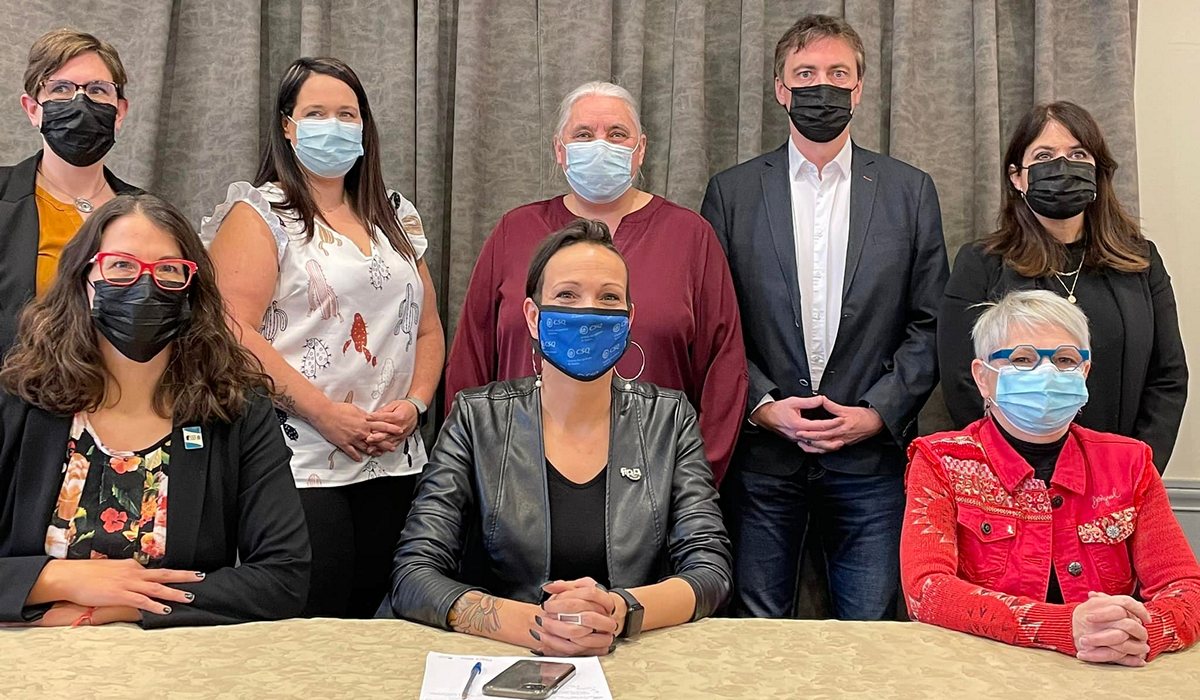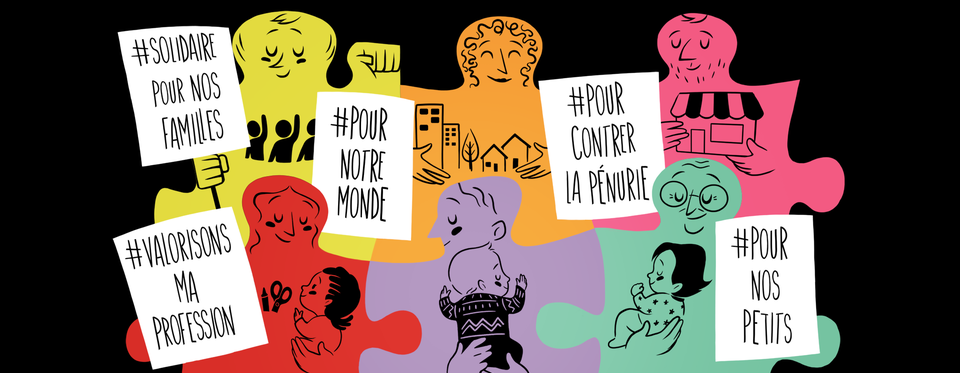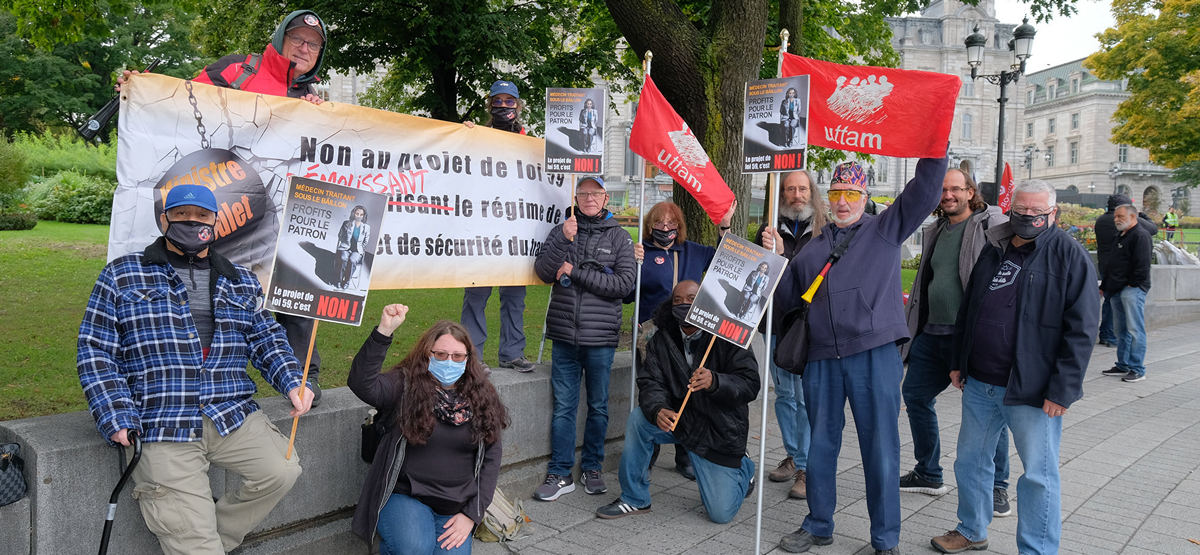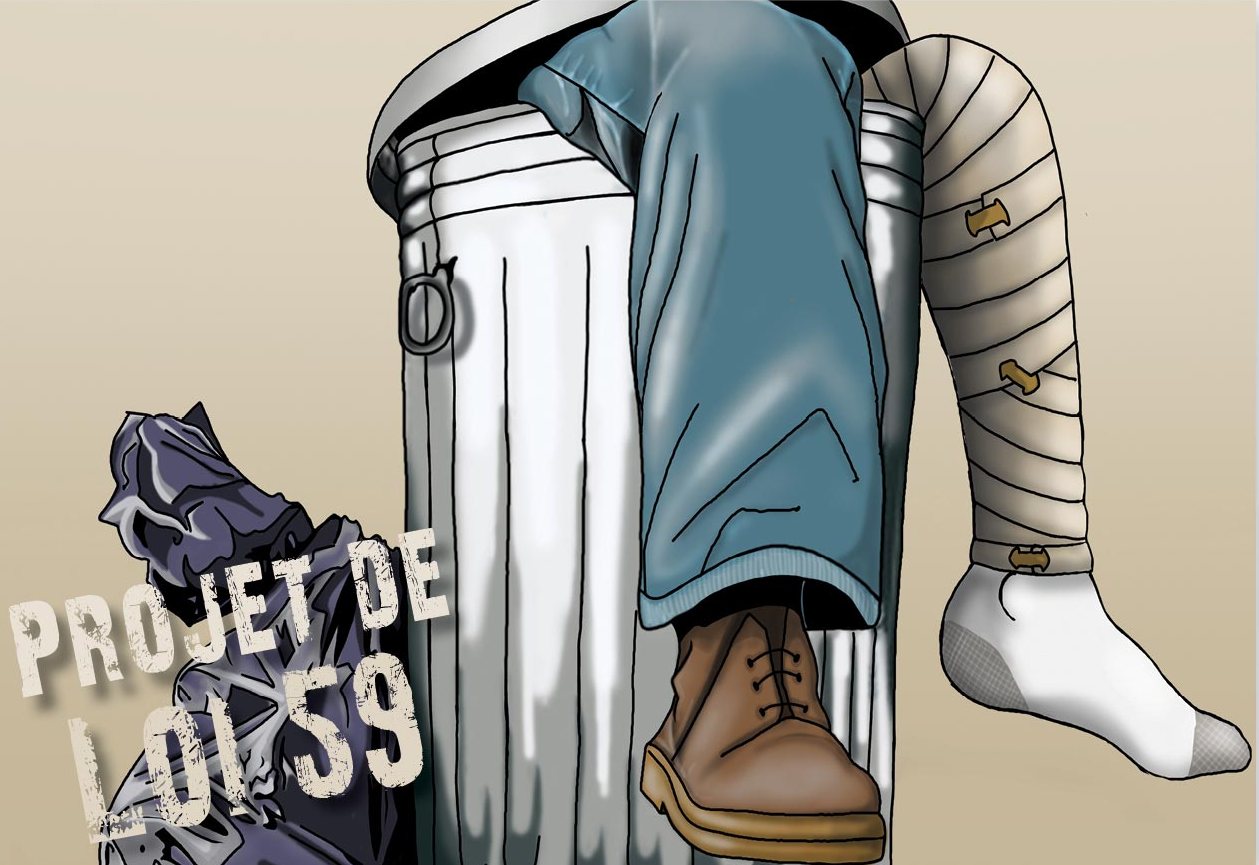|
December 6, 2021 - No. 116
Striking Quebec Daycare Workers Enjoy Broad Support
Call to Speak Out Against
Back-to-Work Legislation
- Ma place au travail - 
Press
conference December 5, 2021 held by coalition of unions, parent
groups and others demanding a just settlement for the daycare workers.
New Occupational Health and Safety Regime in Quebec
• We Will Remain Mobilized and Keep Fighting
- Interview, Félix Lapan
Striking Quebec Daycare Workers Enjoy Broad Support
- Ma place au travail -

The
organization Ma place au Travail (My Place at Work) demands that access
to childcare be recognized as a right by law in Quebec. It is calling
on parents to firmly support the struggle of daycare workers in defence
of their rights.
Workers' Forum is reprinting below the letter the
organization has prepared for people to send to Quebec government
ministers. It was written in response to the statement by the President
of the Treasury Board that back-to-work legislation is part of the
"tools" the government has to put an end to the strike.
***
To: Mathieu Lacombe, Member for Papineau in the Quebec National
Assembly, Minister of Families; Sonia LeBel, Member for Champlain,
President of the Treasury Board; François Legault, Premier of
Quebec.
Re: Reaction to the Early Childcare Centre (ECC) network's unlimited strike
 The
purpose of this letter is to express the full support of parents as
represented by Ma place au travail for ECC educators and support staff. The
purpose of this letter is to express the full support of parents as
represented by Ma place au travail for ECC educators and support staff.
If the government wishes to avoid the consequences of an unlimited
general strike for families, we strongly encourage it to resolve the
situation through a negotiated agreement rather than through the
application of special legislation.
The potential headache of a walkout does not justify the imposition
of a measure that curtails the right to demand improved working
conditions and a better public child care system. We are concerned that
by forcing child care workers to return to work, you will only
exacerbate the conflict: what if they become so discouraged that they
leave
the system they are working so hard to protect? Their working
conditions have to be improved.
The shortage of affordable, quality child care spaces has hampered
work/family balance for many years. Service disruptions are multiplying
due to the exodus of ECC staff. The quality of services continues to
deteriorate with each departure. Added to this is the anguish felt by
thousands of parents waiting for a place, or the despair felt by those
forced to sacrifice their careers, their studies or their mental health
in response to this crisis.
Above all, it is our children who are paying the price. Those with
particular needs who are not receiving the specialized services they
need. Those who face abrupt and ongoing changes that undermine their
integration into a child care setting as a result of staff departures.
Those who have limited time to interact with staff who are exhausted by
the workload created by a lack of instructional time because of having
to complete the children's files. The workers are the backbone of the
daycare centres and we demand that the government recognize the
essential role they play in the lives of our little ones.
 We
object to the government justifying its bargaining tactics on the basis
of the difficulties we currently face in balancing our family and work
responsibilities. Instead, we urge the government to embrace the
changes proposed by those charged with ensuring the well-being, safety
and healthy development of our children. While doing so, we
request that you provide them the resources they need. You will speak
on our behalf by agreeing to their demands. We
object to the government justifying its bargaining tactics on the basis
of the difficulties we currently face in balancing our family and work
responsibilities. Instead, we urge the government to embrace the
changes proposed by those charged with ensuring the well-being, safety
and healthy development of our children. While doing so, we
request that you provide them the resources they need. You will speak
on our behalf by agreeing to their demands.
In Quebec, we have inherited a network of quality public education
services based on a model of governance by parents and for the
community. The result of feminist and grassroots struggles, our ECCs
have ensured the overall development of our children and increased our
collective economic wealth. Thanks to them, Quebec has risen to the
top of the world's ranking regarding the rate of employability amongst
women aged 20 to 54.
We sincerely hope that the government responds to the demands of
daycare workers, which are also the demands of parents who have had the
opportunity to frequent them, but also of those who one day hope that
their child will be able to flourish in them.
Sincerely,
From a tired, but supportive parent

New Occupational Health and Safety Regime in Quebec
- Interview, Félix Lapan -

Contingent
from UTTAM participates in rally outside the national assembly in
Quebec City against Bill 59, September 30, 2021.
Bill 59, An Act to modernize the occupational health and safety regime,
was passed on September 30, 2021, and received assent on October 6,
despite the mass mobilization in opposition to it by all Quebec workers
and their organizations. The legislation is a full-scale attack on the
right of workers to safe and healthy working
conditions. Its provisions are to come into force in stages over the
next two years through implementation of new regulatory powers granted
to the Labour Standards, Pay Equity and Workplace Health and Safety
Board (CNESST).
Workers' Forum recently spoke with Félix Lapan, community
organizer with the Union des travailleuses et travailleurs accidentés
ou malades (UTTAM), about certain aspects of the law that concern the
medical treatment of occupational injuries and compensation for injured
workers. ***
Workers' Forum: What are the main aspects of the law
with regard to the treatment of injured workers and those who suffer
from occupational diseases?
 Félix Lapan: One aspect is about rehabilitation before consolidation [The healing or
stabilization of an injury following which no improvement of the worker's health is foreseen].
This is the power that will be given to the CNESST to impose what are
called rehabilitation measures during the period of
medical care, before medical consolidation. Normally, under the current
plan, which continues until October 2022, people receive physical or
occupational therapy prescribed by their treating physician. As of
October 6, 2022, the CNESST will be able to impose rehabilitation
measures that may include a return to work. It may impose light work,
or
a return to work on a part-time basis because the CNESST says it's good
for the worker's health, good for their rehabilitation. The section
that allows this is very ambiguous with regard to the need to consult
with the treating physician. Our big concern is that the CNESST will do
this without consulting with the attending physician. And if
workers don't do what the CNESST orders them to do, they will be cut
off. This change takes place before the consolidation. Félix Lapan: One aspect is about rehabilitation before consolidation [The healing or
stabilization of an injury following which no improvement of the worker's health is foreseen].
This is the power that will be given to the CNESST to impose what are
called rehabilitation measures during the period of
medical care, before medical consolidation. Normally, under the current
plan, which continues until October 2022, people receive physical or
occupational therapy prescribed by their treating physician. As of
October 6, 2022, the CNESST will be able to impose rehabilitation
measures that may include a return to work. It may impose light work,
or
a return to work on a part-time basis because the CNESST says it's good
for the worker's health, good for their rehabilitation. The section
that allows this is very ambiguous with regard to the need to consult
with the treating physician. Our big concern is that the CNESST will do
this without consulting with the attending physician. And if
workers don't do what the CNESST orders them to do, they will be cut
off. This change takes place before the consolidation.
There are also changes in terms of what happens after consolidation. The
purpose of all of this is to speed up the time for them to be able to
tell someone that they must return to work and that their compensation
has ended.
After consolidation, there are measures to force the worker to go
back to work with the former employer even if they are no longer able
to do the job they were doing when they were injured. Under the current
system, if someone has functional limitations that prevents them from
doing their job, if the employer does not offer them a suitable
job the CNESST must provide vocational rehabilitation. This may involve
training, job search assistance or identifying suitable employment
elsewhere in the labour market. As of October 6, 2022, the CNESST will
seek solutions with the employer at all costs, even if the worker does
not want to return to work with their former employer.
In non-unionized environments, in cases where the employer has
contested the worker's claim, the worker is often happy to be
rehabilitated elsewhere. This will now become very rare. Instead, the
worker will be told that there's a lighter job available with the
employer. Then, if the employer doesn't take the person back or gets
rid of them, the
CNESST will wash its hands of them. This is a major concern that we
have. In a unionized environment, the union will oversee the return to
work. If the employer does not make a suitable job available, the union
has recourse, it can file a grievance, etc. In the case of non-unionized workers, they will essentially be left
on their own. The CNESST will say that it considers that they can do a
lighter job with their employer, it makes a decision. If the employer
kicks the worker out a week later or the worker is not able to do this
supposedly suitable job, workers will be caught up in complicated
appeals against their employer during which they will not be paid
because the CNESST will have closed the file.
 It's
as if there's been a change in the philosophy underlying the law on
vocational rehabilitation. Under the current system, when you are
unable to return to work, you often benefit from vocational
rehabilitation. Under the new system, these aspects will come into
effect on October 6, 2022 and rehabilitation elsewhere on the labour
market will
become the exception. The norm will become allegedly suitable jobs with
the former employer that the CNESST will decree. The worker will have
no choice but to return to the original employer or lose his or her
rights. They won't be entitled to anything. It's
as if there's been a change in the philosophy underlying the law on
vocational rehabilitation. Under the current system, when you are
unable to return to work, you often benefit from vocational
rehabilitation. Under the new system, these aspects will come into
effect on October 6, 2022 and rehabilitation elsewhere on the labour
market will
become the exception. The norm will become allegedly suitable jobs with
the former employer that the CNESST will decree. The worker will have
no choice but to return to the original employer or lose his or her
rights. They won't be entitled to anything.
With regard to the measures that come into force on October 6,
there's the removal of the presumption of incapacity to work for
victims of occupational diseases who are 55 and older. For those who
can no longer do their old job, there is currently protection. For
example, right now, a 56-year-old worker who has asbestosis and can no
longer
return to work receives compensation until retirement. Under the new
law, that protection disappears as of October 6, 2022.
Another important change has to do with everything related to
medical assistance. This comes into effect once the CNESST regulations
come into force. With the reform, the CNESST has gained full regulatory
powers. It will be able to adopt a regulation on medical assistance,
which will now be called "health services and adapted equipment."
For the first time since 1985, this will allow it to place limits on
entitlements to drugs, orthotics and prosthetics. Currently, workers
are entitled to whatever the attending physician prescribes in
connection with their injury, with 100 per cent reimbursement from the
CNESST. The CNESST will now be able to regulate reimbursements for
adapted
equipment and medications, and will be able to exclude categories of
medications. We don't know exactly what their regulations will look
like, but we are very concerned about their being given this regulatory
power.
These are some of the important examples of rollbacks contained in
the legislation. I think the reason for the staggered implementation is
that the government wants to give the CNESST time to get everything
ready because it is a major change in philosophy in key aspects of the
system. Some changes came into effect the moment the
legislation received assent, some are to come into force six months
after receiving assent, some will come into effect twelve months after it
received assent, while others will only be implemented in 2023.
WF: What is the purpose of these changes brought about by the law?
FL: The aim is to shorten the time people will be
entitled to compensation, speed up their return to work and reduce
access to medical assistance and the costs of medical assistance.
I want to point out that while there are huge setbacks, we are
pleased with the fight that we waged. We were able to avoid many of the
setbacks the bill included when it was introduced. For example, in the
original bill, it was virtually impossible to have occupational
deafness recognized. Certain cases of hearing
loss were excluded and all kinds of
conditions were added to allow claims for occupational deafness caused
by noise at work to be recognized. Hearing loss represents about
two-thirds of the accepted claims for occupational conditions in
Quebec. There has been an explosion in deafness costs in Quebec. The
level of noise in Quebec workplaces has been very high for decades as
the
standards were lower than those recognized in other jurisdictions
throughout North America. The noise exposure standard in Quebec was
extremely permissive, and it just changed last June. The Minister
backed down on his rollback on occupational deafness and on other
issues, such as the conditions for the recognition of lead poisoning,
for
example, which were virtually impossible in the initial bill.
Our mobilization forced the government to back down on many of the
bill's rollbacks. At the same time, the CNEEST has gained regulatory
powers on occupational diseases and could bring these things back. We
will remain mobilized and we will continue to fight. The CNESST is
going to try to use these regulatory powers and we will
mobilize against any regulation that restricts our rights. 
(To access articles individually click on the black headline.)
PDF
PREVIOUS
ISSUES | HOME
Website: www.cpcml.ca
Email: office@cpcml.ca
|

